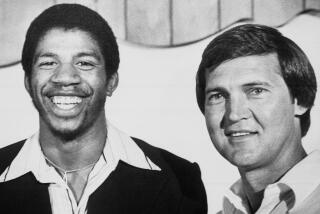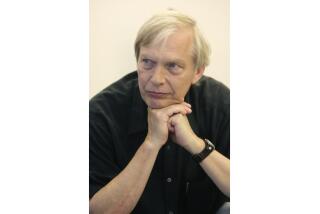Broadcaster Back From the Bottom
- Share via
The story Bob Elder is about to tell is one he’d sent out over the radio airwaves, week after week, year after year.
It was news, but then again, it wasn’t: Sports figure hits the big time, hits it in no time, hits the coke, hits the bottle and hits the bottom. It’s your basic substance abuse story. Just plug in the name of the day.
Elder read the news, covered the news and turned out to be too good a reporter for his own good.
This was one story he over-researched.
“I went to a party when I was 21,” Elder likes to say, “and I came back when I was 41.
“It was one hell of a party.”
The party kicked into high gear in the late 1970s and early ‘80s, when Elder was king of the Orange County sports radio-TV hill. It wasn’t much of a hill, but Elder knew how to make it work for him. His talk shows at KEZY and KDOC-TV comprised a career, but they also created a life.
Elder got invited to parties. He got introduced to women. When he looked in the mirror, he saw white lines of cocaine.
Elder had connections. In the less-than-sightly world of media advertising, there’s an arrangement known as “the trade-out,” in which companies trade products--cars, food, clothes--for commercial air time. Elder, in his own words, was “the trade king of the world.”
“I sold time to Datsun and Chevrolet and they let me drive their cars,” he says. “I had an entire wardrobe from Dayton’s. I had a running tab at the Rose & Crown (restaurant). I did commercials for Los Caballeros and they put me up in a $1,000-a-month condo.”
Elder had everything and he had nothing. There’s one major problem with trade-outs: Whatever you trade for is on loan. Elder couldn’t afford the fast track. Instead, he tried to lease it.
“It’s a fast-paced world and when you’re young and unmarried, you think you’ve got the world,” Elder says. “You’ve got all the flashy cars and clothes and you want to be a part of everything, but you’re not making the money that your ballplayer friends are.
“I mean, (Rod) Carew and I were very close, (Bobby) Grich and I, all those people, and those guys were making big salaries. Not me. But I lived the life style with them. I’d fake it.”
Elder had no safety net. When the crash comes for the star athlete, he winds up in drug rehab for a month and then back in the starting lineup. He still comes home to his BMW and his Jacuzzi and his five-bedroom spread in Newport Beach.
When the crash came for Elder, he wound up sleeping in a parking lot.
By 1989, Elder had moved on along the mass media trail and was producing a cable TV show called Golf Journal. It was a cushy gig--junkets to Morocco, Jamaica, Mexico, the best golf courses in the world--but by the middle of the year, the plug was pulled. The station wanted to make a switch and bought out his contract. The trade-outs dried up.
Elder briefly caught on with one of those 1-800 sports phone lines, reading off hourly updates and scores, but was fired after staging a six-day party in the boss’ office while the boss was out of town. A particularly bad move. By then, Elder was sleeping on his boss’ couch, so when he lost a job, he also lost a bed.
Boysen Park in Anaheim was next. “I’d sleep under the trees,” Elder says. Or he’d try the back of the Rose & Crown, his old haunt. “There was a shed behind the restaurant where they’d store beer kegs and tables,” Elder says. “I used to crawl in there and spend the night and try to wake up before 7, when they’d come to open the place.”
Contrary to one report, Elder insists he never slept in a dumpster--”Although if you would’ve thrown booze or drugs in one, I’d have jumped in.”
Elder traveled by foot or by bus, whenever he could scrounge up the change. “I remember waiting for the No. 49 bus in Fullerton, to get me to the bar,” he says. He ate by stealing. “I’d go into supermarkets and stuff ham and sausage and salami and cheese in my shirt,” he says. “I was so thin at the time, people wouldn’t notice.
“I was just asking to be picked up.”
Eventually, Elder was, though not by any security guard. Instead it was an old defensive end, an old friend named Jack Youngblood, who made the tackle.
Youngblood had been tipped off by Keith Phillips, owner of the Rose & Crown. One day, while Elder was sidled up to the bar, Phillips called Youngblood to arrange an ambush. “I went outside to do some drugs,” Elder says, “and there was Jack’s truck pulling in. We went back inside and Youngblood’s first words to me were, ‘Bobby, you’re (messing) up. You got to stop.’ ”
When Jack Youngblood talks, even Elder has to listen. Within a week, Elder was admitted into Cornerstone, a recovery house in Tustin.
That was late September, 1989. He left the following February.
“I went in for 30 days,” Elder says, “and I stayed for five months. I really took to the program, I felt comfortable there. I fell in love with it.”
Stranger yet, he fell in love. During the recovery program, Elder met Linda Lawless, who’d fought a similar battle 10 years earlier. She became a one-person support group for Elder and when he left Cornerstone, she also provided him a home.
They are engaged to be married next month.
“It took somebody like that to turn me around,” Elder says. “It was like, ‘Somebody likes me.’ She put all that time in, she stood by me. When people say, ‘He’ll go back, I know him too well,’ she’s the one who tells me, ‘If you can do it now, you can continue to do it.’ ”
Elder says he has been sober for 13 months. He’s telling his story now because at Cornerstone, “they tell you to wait a year. Most people fail within the first year.”
He has other stories to tell, which he does every weekday morning at KEZY. Elder has been back at the station for three months, serving as sports director. He does three daily segments for KEZY, four for sister station KORG, chips in with five-minute spots at KCAL in San Bernardino and hosts a national football cable TV show, which is syndicated weekly in 25 markets.
His life appears reassembled, yet Elder still feels claustrophobic. He talks of cynics and doubters, waiting on the sideline to swoop at the first misstep.
“Some people think it’s phony,” Elder says. “People think it’s an act--’You’re just the same, this is just a new way to get what you want.’ If they want to think that, fine.
“I spent five months living in a room with eight other guys. I’ve been as low as you can get. Not showering for a week. Not eating. Stealing. Lying.
“People think I want to get back into that life? I’ve been up and I’ve been down and I can tell you: Up’s a hell of a lot nicer than down.”
More to Read
Sign up for Essential California
The most important California stories and recommendations in your inbox every morning.
You may occasionally receive promotional content from the Los Angeles Times.




![Vista, California-Apri 2, 2025-Hours after undergoing dental surgery a 9-year-old girl was found unresponsive in her home, officials are investigating what caused her death. On March 18, Silvanna Moreno was placed under anesthesia for a dental surgery at Dreamtime Dentistry, a dental facility that "strive[s] to be the premier office for sedation dentistry in Vitsa, CA. (Google Maps)](https://ca-times.brightspotcdn.com/dims4/default/07a58b2/2147483647/strip/true/crop/2016x1344+29+0/resize/840x560!/quality/75/?url=https%3A%2F%2Fcalifornia-times-brightspot.s3.amazonaws.com%2F78%2Ffd%2F9bbf9b62489fa209f9c67df2e472%2Fla-me-dreamtime-dentist-01.jpg)








